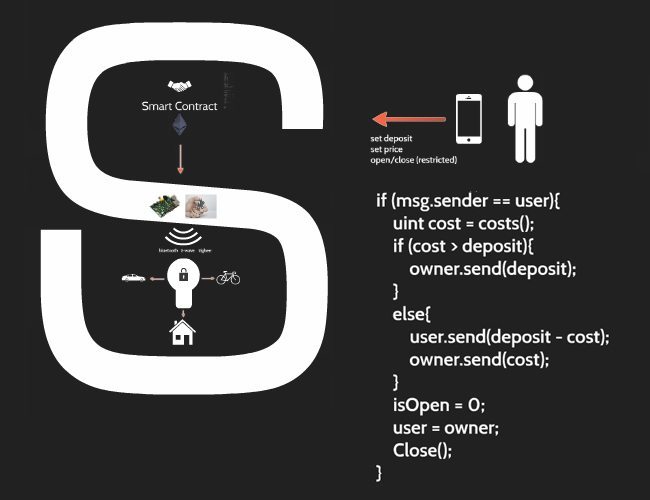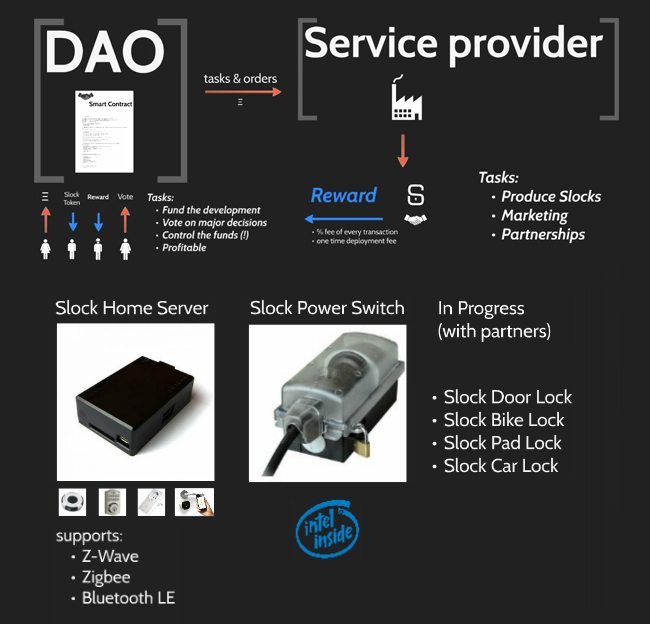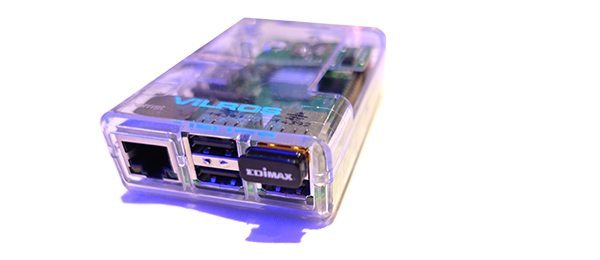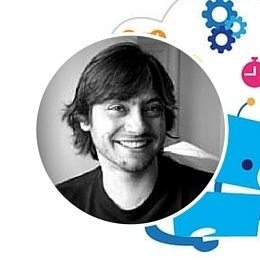Postscapes: Tell us about your background with blockchain projects and how you got involved with Slock.it.
Stephan: My background is in machine learning for customer insight at subsidiaries of VISA and BNP Paribas – so basically I was one of the guys sending the coupons you probably don’t want to receive in your mail (but, alas, that stuff works!)., In 2013 I was looking for something to do that would be more meaningful. I started a cryptocurrency consultancy, Ursium, my own business.
Literally weeks later I read the whitepaper on Ethereum by Vitalik Buterin. It blew my mind. I just wanted to work for these guys! I joined the Foundationalmost at the beginning, in January 2014.
Now Ethereum is at an interesting time in its life. The Ethereum Foundation got things started and released version one of the protocol, which is live. Now it’s time for the way the software is written to evolve. The keyword is “decentralized”. Commercial companies like Slock.it, Ethcore andConsensys will probably become the caretakers of parts of the protocol going forward, like Linux. I think that is really healthy, because we need that commercial support in order for the technology to be brought forward in front of the mainstream public. The Foundation got us this far, but now we need to get to the next level with this technology — embed it in websites, in products, in everyday life.
After I left the Foundation, I bumped into a former colleague, Christoph Jentzsch, who invited me to Berlin to check out some prototypes he had. I saw him run a transaction on the blockchain, which seconds later opened a connected door lock. I was blown away. That was exactly what I had in mind for half a year: the intersection of the physical and the digital. Devices can be independent actors on the blockchain — they can consent to contracts, spend money, talk to each other, all independent of human control.
With Slock.it, we are starting with realistic goals. We have this concept of a “slock”, which is a funny name for a digital lock. That term really encompasses anything that includes our technology, which marries the blockchain and the Internet of Things. It starts with the requirement of turning something on and off, opening something, closing something. The idea is to stay pragmatic, because there are a lot of wild futuristic ideas for the IoT, but we are not quite there yet. There is just not enough demand. But locks — that is useful.
Electronic locks are pretty much everywhere. They are starting to make their way to peer-to-peer rental properties like Airbnb, because renters are realizing there is a real benefit to automation. Say I own a house and I want to rent it. Today I have to go through Airbnb, which charges 15 percent. With Slock, the person who rents your house pays directly to the lock itself. The lock enters into a smart contract with the renter: “You leave a deposit, you pay X amount a day or a week, and then when you leave we’ll give you back the deposit.” The money the renter paid goes back to the person who owns the property. Now you don’t need Airbnb anymore, so you save 15 percent, and the savings can be passed on. That is possible today, not ten years down the line.

Postscapes: Normally we ask people for an elevator pitch, the sort of thing they’d say to potential investors if they had 30 seconds. But it seems like Slock.it is not going that route exactly. What’s the big vision for what you’re trying to build?
Stephan: There is this concept of a <href=”#applications” >DAO, or Decentralized Autonomous Organization, which really is just a computer program. It’s a computer program that runs on the blockchain — the Ethereum blockchain in our case — and defines company governance. The DAO program knows that Stephan has three shares, and Ted has five shares, and that there’s a vote every week when you can vote on this and that aspect of the DAO’s operations, and so on. Everything is recorded and nothing can be corrupted, because everything is stored in the blockchain forever.
It’s a new way of thinking about a corporation, because it automates governance and makes it transparent, which I think is really important in today’s world. It also mostly automates management, which I’m really excited about. It really removes the red tape. If you want to start a company, you just deploy the program, and you advertise it, and people decide to join it or not depending on how attractive your business model is. That’s it.
We want to build a DAO for the sharing economy. We are not saying we’re going to raise money from investors, we are saying that we want to help build a DAO. We have to help get it started because no one has done this before, so we are raising money on behalf of this DAO by selling tokens — you can think of it as a pre-sale. All the funds go into the DAO itself, and then the DAO will decide on a service provider. And that service provider could be us at Slock.it GmbH, or it could be someone else. There will be a vote of the DAO membership: Which service provider do you want, which one offers the best value and has the best deliverables?

In this case, obviously, we are keen for that first service provider to be us, because we are investing quite a bit of money, time and passion in this. If we’re not chosen, well, that’s life. It would have been an incredible experiment. I think it is going to be us, but if not then that’s okay too.
In any case, that DAO can fire us at any time. Say Slock.it is picked as the service provider, and then a day later someone finds proof that our company is making use of the money in ways it wasn’t meant to be used. At that point the DAO can say: “You haven’t done your job, you’re wasting money, so you’re fired! We’ll cancel our contract on the blockchain for all of this and we’ll find a new service provider.”
The DAO can also change the operating parameters of how it relates to the service provider. For example, if there was a clause that stated, “A percentage of the funds that are derived from the usage of slocks will go back to the DAO” — because it needs revenue, it needs income, it is a company after all — that percentage can be variable, so the DAO can vote on that as well. Which is neat, because it’s part of our contract, so if the next service provider has come up with a brand-new way of leveraging the sharing economy, it can take over immediately — all of this is self-executing. It’s really a powerful concept. I don’t think it’s ever been done before.
Postscapes: I’ve read about DAO’s, but this is the first time I’ve ever come across somebody who’s talking about actually starting one. Who are you pitching the idea to, and how do you explain it?
Stephan: I would love to say that we are pitching to people who own Airbnbs or want to contribute to the sharing economy. To a certain extent we are, but this stuff is still pretty foreign to a lot of people. I think our audience at first is going to be what we call the “crypto-audience” — people like the Ethereum community, and all the people who’ve followed our work in the last couple of years. I think that’s where our audience is mostly going to be at the beginning, but we want to extend that, of course.
One way to do this is to partner with people who manufacture locks, and integrate the technology. Ideally, people would use our technology but they wouldn’t know about it. I am a firm believer that it’s the applications that matter, and not the underlying technology. For example, Facebook uses something called Hadoop, which is a really cool database technology. Absolutely no one in the world cares. What they want are the status updates and the funny cats. No matter how technologically exciting Hadoop might be, it’s just a means to an end.
In our case I think it’s kind of similar. We shouldn’t be out there trying to sell a platform, because no one wants to buy a platform. What they want is the convenience and savings of not having to depend on middlemen to share their property. In the next year or two our mission is going to be to extend our audience from the still-relatively-niche crypto community, and into a more mainstream audience. People who are interested in smart objects, rentals, things like that.

There’s a company called Drivy in France that does peer-to-peer car rentals. Their website has a map, and users can filter the options by how much they want to spend and what kind of car they’re after, and just like Airbnb they can see available vehicles on the map. So they opt to rent your car, you go there, you meet with the person, you exchange keys, you make sure they’re not a psycho killer or a drunk who’s going to crash your car or something, and off they go. There’s a reputation system to keep it all together. It’s really cool right? The problem is, you have to meet the renter in person to gauge them and physically exchange keys, and you have this reputation system which is very obviously limited because they are just getting started. Then there’s payment, which is mediated via yet another third party who also takes a cut. Our solution solves all three problems.
The first one is, you don’t need to exchange keys — because in our context, the keys are digital and can be exchanged online. We are not there yet with many cars, but Teslas are already using digital keys to start the cars. So it should be trivial to integrate our technology.
Second, in the decentralized context, your reputation follows you from one service to another. If you use the decentralized version of eBay you would gather a reputation there, and that reputation would go towards the decentralized Airbnb, and the decentralized whatever. There are no more silos. When you get onto the decentralized website, it already knows who you are because you broadcast your public key, which identifies you. By definition, only you can hold this public key. So you don’t need to sign up, you don’t need to login, and your reputation from elsewhere in the decentralized world follows you, which is pretty cool.
Our solution also makes it possible to execute direct payments, which is safe and secure because it’s all cryptocurrency-based. It solves an awful lot of problems. Many people are scared of sharing their cars. This could go really long way in helping alleviate those fears. You could even imagine a system where the car could be immobilized by the smart contract itself. If you haven’t paid, the car stops running.
Postscapes: The more I read about these practical ways to apply the blockchain, the more it sounds like something out of a William Gibson novel from the 1980s. He was imagining a lot of the social impacts that we’re now seeing from decentralized technologies, even though he probably didn’t have any concept of a blockchain at the time. It blows my mind.
Stephan: That’s why I was drawn to Ethereum, because it was just this revelation of how we could reach out into the future, define the Internet of the future, and build it – but with today’s technology.
Postscapes: Why did Slock.it decide to go with the DAO model for this company and not a more traditional startup route?
Stephan: We think the DAO will raise considerably more funds — and therefore have a much better chance at achieving the ambitious vision of a decentralized sharing economy — than if we had said “trust us with the money” like all startups do today. We also think it’s the future of how business will operate, and we’re willing to eat our own dog food, so to speak.
Postscapes: That seems like a huge advantage over crowdfunding campaigns, where backers are always taking a risk that a company will mismanage their money and they won’t get anything back.
Stephan: I think so too. The DAO also won’t have to pay 5 percent to a crowdfunding platform if it’s successful. There is very little downside. The primary downside of this model is that this cryptocurrency world isn’t well-understood by a lot of people yet, so our audience is considerably smaller.
Postscapes: You mentioned earlier that Slock.it plans to partner with lock manufacturers to integrate your technology. Slock.it also sells an Ethereum Computer that seems to work like a home server for communicating between the blockchain and a user’s connected devices. What exactly is the function of the Ethereum Computer for a user, and why would you take this approach to the hardware?

Stephan: The first reason is for early adopters to be able to bring the Ethereum Computer into their home, where it can run Slock by talking to existing smart locks over ZigBee, Z-Wave, and other protocols. From there we’ll start seeing the first doors, fridges, and all sorts of objects and devices enabled with our technology. So that’s going to create an embryo, if you will, of a “smart things” market — while in the meantime we’re also working with partners to develop locks that use our technology natively, something which is maybe a longer-term process.
The second reason is because there is a market for the Ethereum Computer itself, in the sense that Ethereum is easier to use than other projects but it’s still a bit technical. You need to run the client on your computer, and that’s okay, but sometimes you might want to turn off your computer — and you would like for the Ethereum-enabled stuff, like slocks, to continue running. You don’t necessarily want permanently-on software to run your Ethereum client; you want that to be hardware-managed and for it to live in your home, like a router. Then when you want to interact with the Ethereum blockchain, you proxy your request through that hardware. And once you have the hardware plugged into your television, you can run all the cool new decentralized apps you want without having to worry about installing the stack, updates, etc.
Third, you don’t have to trust any third party with your stuff, which is really the point of decentralized networks in the first place. We want to keep it that way. The Ethereum Computer acts sort of like your wallet, your identity, as a guardian to your personal information — and your information and your funds stay under your control.
And finally: I don’t know if you can call the Ethereum Computer a “proof of concept” for machine-to-machine communication, but it’s a way to test these ideas around having smart objects that would be fully autonomous in the home and that would make decisions on the behalf of users. We are going to be able to experiment with a lot of stuff of that nature, and we think that has really good commercial applications. We know IBM has looked into this recently in the ADEPT project, and we would like to continue on that path ourselves.
ADEPT had an Ethereum-connected washing machine, which would order its own detergent, spare parts and maintenance. By using some smart monitoring, it’s able to know if something is about to go terribly wrong, and at that point it orders preventative maintenance, which is cheaper than full-on maintenance. It knows an awful lot about you: If you wash a full load on a heavy cycle on Sundays, it knows you’re probably playing football that day; or it knows how many kids you have based on how heavy the loads are and their frequency. That probably sounds like “Big Data” and even “Big Brother”, but the interesting thing here is that the washing machine never sends the data outside your home. It never talks to a centralized server. It just orders stuff on your behalf at the best possible price and frequency — without the data ever leaving the confines of your home, which makes it safe and privacy-friendly. I’m really interested in the concept of analytics at the edges of the network, and over the long term we want to build smart objects that are fully autonomous.
I think the Ethereum computer is a good way to get things going because it connects to daily life and we can start playing with a better way to build smart things. We can start running experiments. I think it’ll catch people’s eyes and imaginations.
Postscapes: How do you see the block chain evolving, especially as it intersects with the IoT, five or ten years into the future?
Stephan: Right now what I’m observing is that there is an awful lot of hype, and I am hearing things that are starting to frighten me a little bit. For example, I was interacting with a senior government official in France about their views on the blockchain, and the first thing they said was that they were interested in blockchains because they are “highly scalable”. Actually, scalability is the weak point of blockchains, so that’s not really a good start to a study. If you’re identifying the biggest weakness as the biggest strength, that means you haven’t done your homework.
I’m seeing all this hype generated by unscrupulous contractors only interested in the short term, and their clients are going to eventually realize that actually this blockchain stuff is still in infancy.
On the plus side, I am also seeing a lot of companies getting into researching and developing a commercial strategy for ensuring that the underlying network, in this case Ethereum, succeeds. Some of them are going to contribute to scalability research, and are going to look into how you could hide the data in the blockchain — because right now you can’t, which is another limitation of blockchains.
Postscapes: Why would you need to hide data?
Stephan: Right now, everything you put into the blockchain is in plain text. If you’re an insurance broker, and you have a list of existing clients, and you switch from traditional databases to the blockchain and all the transactions are now public, people will figure out who your clients are pretty quickly — and that is not a risk you want your business to face. Hiding data is going to be needed. Right now that’s not possible, at scale at least. There are things like homomorphic encryption and zero-knowledge proofs that are being explored, but I’d say those are at least five years down the line.
Scalability is the other big hurdle, because blockchains just don’t scale. The Ethereum network as a whole is barely faster than a 1999-era smartphone. This isn’t something that you’re going to use to render 3D graphics with. It’s much more logic gate-type stuff. It’s good for contracts, where we don’t necessarily need fast computing speed. But the data is duplicated everywhere, and that’s the problem with all blockchains. Someone is going to have to figure that out. There are some very smart people at Ethereum, like Vitalik Buterin, who are scratching their heads right now on how they’re going to solve this. It’s really a puzzle. You’re going to have to solve quite a few of the pieces before you can get the whole picture.
I think adoption is going to be a lot slower than what people are making it out to be, but that doesn’t mean blockchains are not useful. To take a practical example, Bitcoin doesn’t scale very well. I think it’s something like 150 times slower than Ethereum, and yet it’s very useful. I use it all the time. It’s useful to so many people that it has $4 billion of value on its network, which is rather amazing.
The Ethereum network is still pretty slow. People are going to have to figure out how to scale these things without losing the beauty of it, which is that you don’t have to trust third parties. As soon as you centralize you can go faster. That’s why Visa Europe can do something like 20,000 transactions per second just before Christmas, and Bitcoin can do seven.
So it will take time. Something doesn’t have to take over the world to be useful. It could be very useful to a small community, and still have value and still be able to survive.
Postscapes: The speed of the Ethereum network is something I have been wondering about. The whole peer-to-peer rental concept kind of breaks down if I’m going to have to stand outside, and wait, and wait, and not know exactly how long it’s going to take for a response to come back from the blockchain.
Stephan: For that reason, we don’t rely on the blockchain for the opening and closing of the lock. We rely on the blockchain for the payment side of things and for the rental contract — the ownership part of the equation, defining who owns what and who has access to what — because that doesn’t take long. On Ethereum, transactions on average take 15 seconds. That’s not too bad. Most of these are going to be done from home, ahead of time, anyway. In the extreme use case that you’re waiting for the rental car to open and it’s pouring down rain, you’ll have to wait 15 seconds. Hopefully it gets better, but I think 15 seconds is acceptable in this context.
For the actual opening and closing, subsequent to the rental, we use something else called Whisper, which is a part of the Ethereum technology stack. It’s a peer-to-peer, machine-to-machine communication protocol, which is an order of magnitude faster because it doesn’t rely on the blockchain but can still interact with it. It’s very useful for us; that way, you can open and close a lock that you’ve rented without having to do an Ethereum transaction every time. You don’t even know the Whisper messages are happening, because they’re hidden behind the interface of an app.
Postscapes: What’s in Slock.it’s immediate future, as you move toward getting the funding for the DAO?
Stephan: January is probably going to be the date of the pre-sale for the DAO. We’re really looking forward to that, as you can imagine, because we have been spending the last few months working on those projects and we really want to see that take off. There’s going to be a few more announcements between now and the pre-sale, mostly related to staff. Quite a lot of smart people are joining our team, and a lot of them are going to be recognizable faces in the field — so if you’re interested in crypto, you will know who these guys are. It’s going to be a pretty bad-ass team.
Postscapes: The pre-sale sounds like a crowdfunding campaign crossed with an IPO. How exactly does it work?
Stephan: I think it’s the future. When we started Ethereum years ago I remember going on stage, and saying that anyone was going to be able to start a company. You’re some guy in the developing world, you just have your cell phone, and you’re going to be able to have an entire company — the whole governance, the whole voting process, the board mechanism, and how it all gels together — all at your fingertips for almost zero cost. No need to go register the company, no need to deal with corrupt officials — you just do your business. You can get international investors overnight. You don’t have to worry about local or national regulations, or about international sanctions and that sort of thing. You will be able to just do business. Business is business. That is exactly the revolution in entrepreneurship that Ethereum can bring about.
This is a technology that brings freedom by default, and it can’t be censored. That might rile a few people right now in 2015 or 2016, but I think in 2025 people will see it as business as usual. We’re figuring out a way to make the old world and the new world coexist, but I don’t think we quite have that just yet. When you are part of this sort of thing, you still feel like you’re trailblazing every day.
Postscapes: I don’t want to put words in your mouth, but it sounds like there is maybe some worry out there about how governments and traditional corporate players in the industries that are being challenged here might respond.
Stephan: Yes, definitely. I’m more of an “ask forgiveness later” than “ask permission” type of guy, so I might not be as worried as some of my peers. But the reality is it really puts things into question when you can self-organize this way. Never mind companies — think countries, think groups self-organizing and saying: “We now have a voting process that can’t be corrupted.”
If kids are growing up on that sort of technology — and they will, because there will be blockchain-enabled mobile apps pretty soon, and at school they’ll already be using incorruptible structures that cannot be censored to just trade marbles and decide who is going to be the school prefect — when these kids grow up and they see the sorry state of the voting process for democratic elections, I think they will start questioning it.
When the Facebook generation grew up, they didn’t want to use the old enterprise applications at work. They thought of them as rubbish. Why are we paying this guy $20,000 to make a website when I can do it for $50 using WordPress? They start questioning things like that.
I think we are going to see the same process of questioning, but this time with how we structure our society, and I think that’s a good thing. A lot of people also think that that’s quite scary.
Postscapes: Thanks for talking with us.
If you would like to learn more about the project you can follow Stephan at @stephantual as well as the Slock.it project on their website http://www.slock.itTwitter @slockitproject and blog https://blog.slock.it





